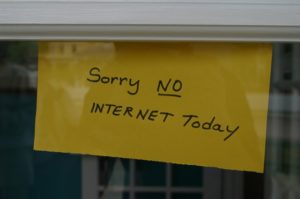When your 14-year-old son and the checkout guy at the supermarket are thoroughly conversant with the latest attempt at Internet-controlling legislation, you know someone, somewhere, succeeded with their communications.
And so it was yesterday, with the forces unleashed through the most powerful Internet companies in the world — which, in a movement that built up to one big day of protest, effectively killed SOPA and PIPA (aka the Stop Online Piracy Act and the Protect IP Act). But, of course, this wasn’t just about the power of Internet companies; it was about all of us, using the technologies they created, pointing out the ludicrousness of both bills.
I’m probably not as well-versed in either as I should be, but I know enough about them to know this: that yesterday, in the U.S., we crossed the Rubicon. It was the day where we proved the online world’s power as a social medium in a way that no amount of wildly popular cat videos ever could. As Wikipedia went black for the day, and other sites obscured their logos (Google), or became points of distribution for protest (Twitter), the Internet showed the true reach and force of its intensely interconnected world.
In a world where power has usually meant money and connections, yesterday was a breakout in terms of permanently altering those concepts. In fact, on one cable news show last night, the hostess mused whether — despite all the coverage the issue had gotten yesterday in traditional media — it was actually needed to spread the word about what was going on at all. She rightly guessed “no.†Ditto to all those who went to K Street thinking money and connections would get these bills passed. What’s money and connections when pitted against hundreds of millions of people with the ability to express themselves?
Just how powerful is the online world? Well, I went to the supermarket right after I noticed that Mark Zuckerberg’s status update on Facebook on the topic had received almost 300,000 “Likes†in three hours (he has slightly over 10 million Facebook followers). That’s when, as I was loading frosting and cupcake mix into my bag, I heard the college-aged guy at the checkout counter next to me going to great lengths to explain the evils of SOPA and PIPA to a customer, who, in case you were wondering, was listening quite intently. Surely this was a first for DeCicco Family Markets.
So maybe I shouldn’t have been surprised that when I got home, I discovered on nytimes.com that as the Washington elite was closing down for the day, it was also effectively caving on its proposed legislation. The updated headline on the same story late in the evening put it best: “In Fight Over Piracy Bills, New Economy Rises Against Old.â€Wow, that was fast! While at the same time being very, very slow.A search on Wikipedia about SOPA (that page was not blacked out) led to sources confirming what was already clear: that the legislators who drafted these bills had little appreciation for, or understanding of, technology, and — no coincidence – also little appreciation for the new-world economy and all of the jobs, innovation and passion it has brought to our country for the last 16 or 17 years. This was apparent in the drafting of the bills, but made ever more so in how people and companies online mobilized against the bills using the very technology that Congress doesn’t get.
While no reputable Internet company is against online privacy, the devil is in the details. Imagine if Facebook had to police everything posted by its hundreds of millions of U.S. users. Well, it couldn’t, of course, but that’s essentially what such legislation would do. It’s astonishing that in 2012, none of the above was apparent to anyone involved with these bills. One can only assume that the old-world power of old-world media had blinded legislators from seeing the world as it really is. How else to explain that no one with the technical expertise to understand the ramifications of these bills was involved?
I don’t have a great closer here, except to state what readers of this column have thought all along: Power to the people — and the almost-entirely U.S.-based Internet companies who enable them.

